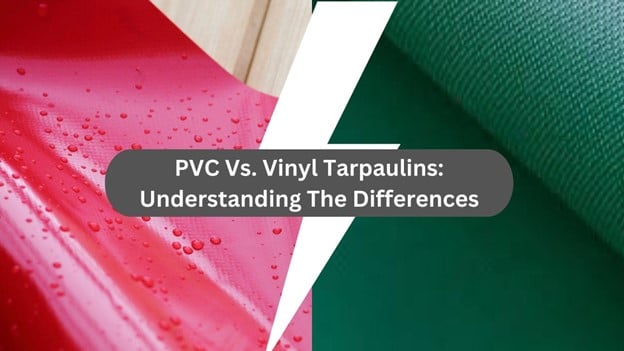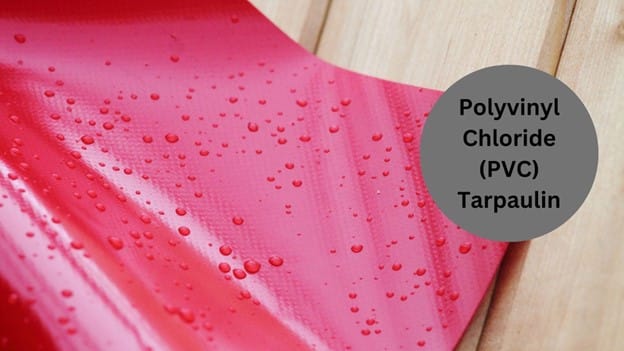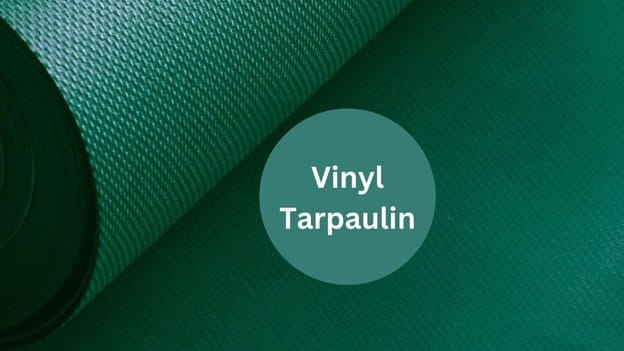We know you have heard about PVC and vinyl tarpaulins more than once, especially if you are looking for weather protection for your goods, commodities, or any other purposes. If you are a new buyer and have little to no idea about different types of tarpaulins and tarp materials, it’s natural to get confused between PVC and vinyl tarpaulins. That’s because they have similar properties and work very similarly.
However, there are some significant differences between these two types of tarpaulins. Let’s explain these differences in detail so that it’s easier for you to decide which of these you should buy and why.
What Is PVC Tarpaulins?
Made from polyester or nylon and coated with polyvinyl chloride (PVC), PVC tarpaulin is a heavy-duty plastic material that is known for its strength, durability, and versatility. It can be used in various industries, including construction, agriculture, transportation, outdoors, and other sectors, to protect goods and commodities from water and weather.
Because it has plastic in its composition, this material is not only strong but also resistant to water, weather, and the elements. It is also resistant to wear, tear, and abrasions and can last for years with proper maintenance and care.
What Is Vinyl Tarpaulins?
Vinyl tarpaulins are also heavy-duty tarps that can stand the taste of time and weather. Made from a combination of polyvinyl chloride (PVC) with synthetic fabric (like polyester or nylon), it is thick, strong, yet lightweight. Vinyl is also flexible, waterproof, and resistant to flame and weather, which makes it suitable for use across industries, including both indoor and outdoor applications. Whether you want to cover your garden furniture or use it in commercial storage, a vinyl tarp will always provide top-notch safety for the goods it is shielding.
In addition to being versatile and flexible, vinyl is also known for its strength and durability. This material will last for years, protecting things from the elements.
PVC Vs. Vinyl Tarpaulins: Major Differences Between PVC and Vinyl Tarps
PVC and vinyl tarpaulins are strong, durable, and versatile. However, there are some significant differences between these two materials that determine their specific use. Let’s discuss the major differences between PVC and vinyl tarps to know them even better.
Materials
Even though polyvinyl chloride is common in both PVC and vinyl tarpaulins, their composition is different. While PVC tarps are made from polyvinyl chloride and reinforced with polyester or nylon to enhance their strength, vinyl ones have a vinyl-coated polyester fabric for better flexibility.
Strength And Durability
PVC tarps are known for their exceptional durability and strength. This material can withstand water and weather successfully and is perfect for long-term use.
On the other hand, vinyl tarps are not as strong and durable as PVC tarpaulins. Although they are strong and durable, they won’t last as long as the PVC ones.
Flexibility
Flexibility is one of the main differences between PVC and vinyl tarps. As PVC tarps are strong, thick, and heavyweight, they tend to be less flexible and, hence, a bit difficult to handle and use. You need to put some effort into installing these tarpaulins for a variety of applications.
However, the same cannot be said about the vinyl tarps. This tarpaulin material is strong but lightweight, which makes it more flexible than the PVC ones. You can handle and use it easily anywhere you want. Also, because of its flexibility, this tarp is easy to fold, carry, and store.
Cost
Because of their strength, durability, and versatility, PVC tarpaulins are more expensive, stated a YT Tarps expert. However, as this material lasts for a long time, the price seems reasonable.
On the contrary, Vinyl tarpaulins are less expensive than the PVC ones. Although they are robust and durable, this tarp will cost you a bit less.
Here is a summary of the differences between PVC and vinyl tarpaulins for your better understanding.
| Features | PVC Tarpaulin | Vinyl Tarpaulin |
| Material | A blend of nylon/polyester and PVC | Combination of polyvinyl chloride (PVC) with synthetic fabric |
| Durability | Extremely durable | Durable |
| Weather Resistance | Excellent | Excellent |
| Weight | A bit heavyweight | Comparatively lighter |
| Flexibility | Less flexible | More flexible |
| Fire Resistance | Yes; suitable for high-risk environments | Yes; less suitable for high-risk environments |
| Lifespan | Longer lifespan | Shorter lifespan than PVC |
| Cost | More expensive but cost-effective | Comparatively less expensive |
| Common Uses | Heavy-duty, industrial | Heavy-duty, outdoors |
Frequently Asked Questions
- Are PVC tarpaulins more expensive than vinyl tarpaulins?
Generally, PVC tarpaulins are more expensive than vinyl tarpaulins. However, as PVC tarps are stronger and more durable, they are worth the money. For long-run usage, PVC tarpaulins proved to be a cost-effective option. - Can PVC and vinyl tarpaulins be recycled?
Both PVC and vinyl tarpaulins can be recycled. However, not all recycling facilities can recycle these tarps. Check with the facility first before dumping your PVC or vinyl tarpaulins. - Are vinyl tarpaulins easy to handle and set up?
Vinyl tarpaulins are generally lighter and more flexible than PVC tarpaulins. Because of their weight and flexibility, these tarps are easier and more convenient to handle and set up for any given application. - Are there fire-resistant options for PVC or vinyl tarpaulins?
Both PVC and vinyl tarpaulins can be treated with fire-retardant chemicals for fire resistance. If safety from fire is your first priority, you can choose any of these tarpaulins for enhanced protection. - Which tarpaulin is better for outdoor events, PVC or vinyl?
Vinyl tarpaulins are usually the best choice for outdoor events. As this material is lightweight and flexible, it’s not only easy to carry but also easy to handle and use.
PVC Vs. Vinyl Tarpaulins: Which One To Buy
Now that you know the differences between PVC and vinyl tarpaulins, it’s easier for you to determine which of these tarps you should buy for your particular applications. As both these materials have some unique properties and usages, it won’t be wise for us to suggest any of these without knowing your needs.
However, it doesn’t matter which of these tarps you need; make sure to contact Tarp PVC when you decide to make a purchase. Tarp PVC manufactures high-quality PVC and vinyl tarpaulins and provides worldwide delivery. Visit their website for more info and custom quote.





